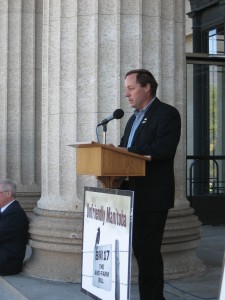 The Hutterite colonies in Manitoba produce close to half of the hogs in the province whether in farrow to finish operations, breeding stock, and finished hogs. It provides a good percentage of their economic livelihood, but also provides good employment for their young people.
The Hutterite colonies in Manitoba produce close to half of the hogs in the province whether in farrow to finish operations, breeding stock, and finished hogs. It provides a good percentage of their economic livelihood, but also provides good employment for their young people.
So when the Manitoba government came up with the anti-farm Bill 17, the colonies for the first time became active in trying to convince the government not to implement the hog moratorium in two-thirds of agriculture Manitoba.
James Hofer is the barn manager at the Starlite Colony near Starbuck and a director on the Manitoba Pork council.
“This is one of the most disgusting things I’ve ever witnessed in my life,” said Hofer after witnessing the government pass Bill 17 in the Manitoba Legislature. “They don’t believe the farmer, the scientist, they don’t believe anybody!”
However, he said very few things are so bad, that something positive can’t come from it. In this case, it also holds true.
“If there is anything positive about this, we pushed the NDP government so long, we pushed them to the point where they exposed themselves,” said Hofer. “We were trying to expose them. They started talking and they verified it, exactly what we were saying all along. It has nothing to do with science but only politics. Would you believe in the end we wore them down to the point where they actually admitted it and said it.”
He said when Conservation Minister Stan Struthers said the Zero Percent solution proposed by the Manitoba Pork Council will do nothing for Lake Winnipeg, and the Manitoba Tories and the Pork Council will not gut Bill 17, they admitted what the producers knew all along.
“If we hadn’t pushed them up until this point, right up against the wall, they would not have admitted it,” said Hofer. “But I think they underestimated how far we would go, what we would do, and what kind of resources we have. I feel in a sense we do have a victory because we demonstrated that we can play hardball with them, as long as they want to play, and as long as the game is on, but now the game is off.”
The Starlite hog barn manager said the colonies will change the blueprint for establishing new colonies.
“In where we locate them and how we establish them in terms of agriculture. Up until now, hogs were primarily, and 90 something percent of the time, the first go to enterprise or business to establish to generate some revenue.”
He said what the Manitoba government has done to agriculture and to food, production is sad.
“I don’t think they know what they are doing. They have no idea what the fallout will be. It might take a little while for things to become obvious, when it comes to food supply, and when the price of food goes up and people have to start paying more, and people even going hungry, then, and only then maybe will they appreciate agriculture,” said Hofer.
The thing that bothers him most is that if a person, a business, a farm, or an industry is guilty, that is one thing.
“When the producers are complying with regulations, doing everything government is saying, it’s a totally different matter,” he said. “The amount of advances that we’ve been able to make in agriculture in technologies, in the way we apply manure and handle it, is huge. Every single application government came out with, we adapted. We streamlined our operations, in spite of all that, government just shuts us down, tells us the lake will become better, if we control you. By shutting down the expansion, it takes away reason for developing new technology. If we can’t expand, why should we further develop technology to make things happen.”
